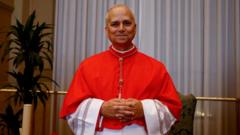The election of Robert Francis Prevost as Pope Leo XIV has made history as he becomes the first American pope, addressing the dual challenges of maintaining continuity with Pope Francis while navigating a divided Catholic Church. His background and approach promise a unique blend of inclusivity and traditionalism in leading the global Catholic community.
Pope Leo XIV: A New Era for the Catholic Church as First American Pope

Pope Leo XIV: A New Era for the Catholic Church as First American Pope
Robert Francis Prevost ascends to the papacy as Leo XIV, marking a historic shift within the Catholic Church and presenting a complex interplay of traditions and modernity.
The election of Cardinal Robert Francis Prevost, now Pope Leo XIV, has reverberated through the world's 1.4 billion Roman Catholics as the first American pontiff. His election signifies not only a shift in papal history but also a rethinking of who can lead the Catholic Church amidst its evolving global landscape. Prevost, who spent twenty years in Peru and recently served as a cardinal at the Vatican, embraced his role with an emphasis on peace and unity, addressing the mixed sentiments within the Church.
With his first address from St. Peter’s Basilica, he opened with, "Peace be with you." Echoing the sentiments of his predecessor, Pope Francis, Leo XIV's message underlined the importance of justice and compassion, a point which resonates deeply with his supporters. The election comes in the wake of significant ideological divisions within Church leadership, as bishops and cardinals contend over the future direction between inclusivity or conservatism.
His American heritage has sparked jubilation in Chicago, where he grew up, and pride in many Americans who view this selection as a reflection of their own country's evolving identity and influence. On social media, reactions have varied from disbelief to celebration, with notable figures from the political realm expressing both congratulatory and critical sentiments. Some hope that an American pope may ease rifts in international relations, particularly in light of the rhetoric from past administrations.
As Leo XIV prepares to lead, his previous statements on contentious social issues, including LGBTQ rights and immigration, remain a focal point for speculation about his papacy. While he is known for his pastoral care, his previous criticisms of certain lifestyles may suggest a continuation of traditional Catholic doctrine while potentially engaging with modern challenges.
In conclusion, Pope Leo XIV's leadership will likely navigate the delicate balance of promoting a compassionate Church engaged with the world's pressing issues while remaining rooted in its theological foundations. His papacy promises to be watched closely as the Catholic Church seeks to harmonize its past with the future amid a rapidly changing global culture.
With his first address from St. Peter’s Basilica, he opened with, "Peace be with you." Echoing the sentiments of his predecessor, Pope Francis, Leo XIV's message underlined the importance of justice and compassion, a point which resonates deeply with his supporters. The election comes in the wake of significant ideological divisions within Church leadership, as bishops and cardinals contend over the future direction between inclusivity or conservatism.
His American heritage has sparked jubilation in Chicago, where he grew up, and pride in many Americans who view this selection as a reflection of their own country's evolving identity and influence. On social media, reactions have varied from disbelief to celebration, with notable figures from the political realm expressing both congratulatory and critical sentiments. Some hope that an American pope may ease rifts in international relations, particularly in light of the rhetoric from past administrations.
As Leo XIV prepares to lead, his previous statements on contentious social issues, including LGBTQ rights and immigration, remain a focal point for speculation about his papacy. While he is known for his pastoral care, his previous criticisms of certain lifestyles may suggest a continuation of traditional Catholic doctrine while potentially engaging with modern challenges.
In conclusion, Pope Leo XIV's leadership will likely navigate the delicate balance of promoting a compassionate Church engaged with the world's pressing issues while remaining rooted in its theological foundations. His papacy promises to be watched closely as the Catholic Church seeks to harmonize its past with the future amid a rapidly changing global culture.























